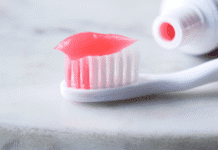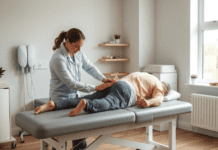Last Updated on January 23, 2026 by Rida Gul
Sleep apnea, a sleep disorder characterised by interruptions in breathing, can significantly impact an individual’s quality of life. While medical interventions are available, many people seek natural therapy for sleep apnea to alleviate symptoms and improve sleep quality.
Obstructive sleep apnea (OSA), the most common form of sleep apnea, occurs when the throat muscles relax, obstructing the airway. This leads to brief periods of oxygen deprivation, which can disrupt sleep patterns and have serious health consequences.
Table of Contents
Natural Therapy for Sleep Apnea
Here are some natural approaches to help manage sleep apnea:
Lifestyle Modifications
- Weight Management: Even a modest weight loss can significantly improve sleep apnea symptoms. Aim for gradual weight loss through a balanced diet and regular exercise.
- Optimal Sleep Position: Sleeping on your side can help keep the airway open. Consider using a body pillow or wedge pillow to maintain this position.
- Mindful Breathing and Relaxation Techniques: Practices like yoga, meditation, and deep breathing can reduce stress and promote relaxation, leading to improved sleep quality.
- Limit Alcohol and Sedatives: These substances can relax the throat muscles, worsening sleep apnea. Minimise alcohol consumption, especially in the evening.
Natural Remedies
- Herbal Remedies: Some herbal remedies, such as peppermint and eucalyptus, may help alleviate respiratory symptoms. Inhale peppermint oil vapour or use eucalyptus oil in a diffuser to open nasal passages.
- Magnesium: This mineral can promote relaxation and improve sleep quality. Incorporate magnesium-rich foods like leafy green vegetables, nuts, seeds, and fish into your diet, or consider a magnesium supplement after consulting with a healthcare provider.
Throat Exercises
Specific exercises, known as oropharyngeal exercises, can strengthen the throat muscles and reduce the likelihood of airway obstruction. These exercises may include:
- Singing: Regular singing can help strengthen the throat muscles.
- Playing the Didgeridoo: This Australian wind instrument requires precise breathing control, which can improve muscle tone in the throat.
- Tongue Exercises: Simple tongue exercises, such as sticking out your tongue and moving it side to side, can help strengthen the muscles in your throat.
Creating a Sleep-Conducive Environment
- Consistent Sleep Schedule: Establish a regular sleep schedule by going to bed and waking up at the same time each day.
- Optimal Sleep Environment: Ensure your bedroom is dark, quiet, and cool. Use blackout curtains, earplugs, or a white noise machine to minimise distractions.
- Limit Screen Time: Reduce exposure to blue light from electronic devices before bed, as it can interfere with sleep hormones.
When to Seek Professional Advice
While natural therapy for sleep apnea can be helpful, it’s essential to consult with a healthcare provider for severe sleep apnea. Untreated sleep apnea can lead to serious health complications like heart disease, stroke, and cognitive impairment. A comprehensive approach, combining natural therapies with medical interventions, may be the most effective solution.
The Role of a Sleep Specialist
A sleep specialist can diagnose sleep apnea and recommend appropriate options. They may suggest lifestyle modifications, prescribe medication, or recommend a continuous positive airway pressure (CPAP) machine.
The Importance of Regular Check-ups
Regular check-ups with your healthcare provider can help monitor your sleep apnea and adjust your treatment plan as needed.
Additional Considerations
- Allergies and Sinus Issues: Allergies and sinus infections can contribute to sleep apnoea by causing nasal congestion and inflammation. Managing these conditions can improve sleep quality.
- Oral Appliance Therapy: Oral appliances can help keep the airway open during sleep. These devices are custom-fitted and can be effective for mild to moderate sleep apnea.
- Positional Therapy: If you tend to sleep on your back, positional therapy can help prevent airway obstruction. This involves using devices or pillows to encourage side sleeping.
Conclusion
By implementing these natural therapy for sleep apnea strategies and seeking professional guidance when necessary, individuals with sleep apnea can improve their sleep quality and overall well-being. It’s important to remember that consistency is key. Small, incremental changes can lead to significant improvements in sleep health.
Apart from that, if you want to know about An Important and Comprehensice Overview of Best Hair Growth Vitamins then please visit our Health Category.
















